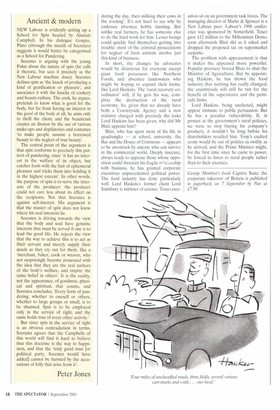Ancient & modern
NEW Labour is evidently setting up a School for Spin headed by Alastair Campbell. In his dialogue Gorgias, Plato (through the mouth of Socrates) suggests it would better be categorised as a School for Pandering.
Socrates is arguing with the young Polus about the nature of spin (he calls it rhetoric, but sees it precisely as the New Labour machine does). Socrates defines spin as 'the knack of producing a kind of gratification or pleasure', and associates it with the knacks of cookery and beauty-culture. The cook, he argues, pretends to know what is good for the body, but far from having an interest in the good of the body at all, he aims only to thrill the client; and the beautician creates an illusion by the use of various make-ups and depilatories and costumes 'to make people assume a borrowed beauty to the neglect of true beauty'.
The central point of the argument is that spin conforms to precisely this pattern of pandering, since 'it has no interest in the welfare of its object, but catches fools with the bait of ephemeral pleasure and tricks them into holding it in the highest esteem', In other words, the purpose of spin is to serve the interests of the producer: the producer could not care less about its effect on the recipients. Not that Socrates is against self-interest. His argument is that the master of spin does not know where his real interests lie.
Socrates is driving towards the view that the body and soul have genuine interests that must be served if one is to lead the good life. He rejects the view that the way to achieve this is to act as their servant and merely supply their needs as they cry out for them, like a 'merchant, baker, cook or weaver, who not surprisingly become possessed with the idea that they are the real authors of the body's welfare, and inspire the same belief in others'. It is the reality, not the appearance, of goodness, physical and spiritual, that counts, and Socrates concludes, 'Every form of pandering, whether to oneself or others, whether to large groups or small, is to be shunned. Spin is to be employed only in the service of right, and the same holds true of every other activity.'
But since spin in the service of right is an obvious contradiction in terms, Socrates agrees that the Campbells of this world will find it hard to believe that this doctrine is the way to happiness, and that the 'truly good man [or political party, Socrates would have added] cannot be harmed by the accusations of folly that arise from it'.
Peter Jones


























































 Previous page
Previous page